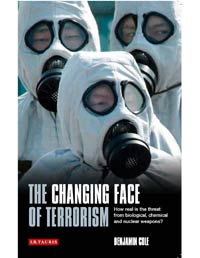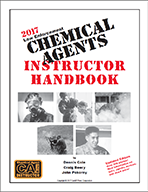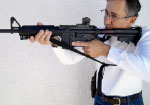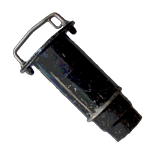All the members of our society live with the threat of terrorism every day. Law enforcement officers are more vulnerable to terrorism, then the general public, because of their high visibility. They, also represent the "establishment" to the fringe element of society that feels they can mandate social change through violence. This violence creates unique problems for the law enforcement officer. The modern terrorist is well armed, equipped and in some instances well trained. The terrorist for the most part is highly motivated to accomplish their goals. Because of the expense of the training involved, most departments have designated one group of people to be the action arm of their response to terrorism. The group is usually the tactical detail of the department.
represent the "establishment" to the fringe element of society that feels they can mandate social change through violence. This violence creates unique problems for the law enforcement officer. The modern terrorist is well armed, equipped and in some instances well trained. The terrorist for the most part is highly motivated to accomplish their goals. Because of the expense of the training involved, most departments have designated one group of people to be the action arm of their response to terrorism. The group is usually the tactical detail of the department.
Officers selected to work in this detail must have qualities that will allow them to function under unusual circumstances. Identifying and selecting those people is very difficult. The following describes the process and the type of individual that most agencies feel will succeed in this job.
A selection process usually consists of shooting skills and physical conditioning assessment, background investigation, interview and a high stress basic tactical training academy. Selection is a difficult problem in any situation. In cases where the exact nature of a task is unknown, selection is even more difficult.
 Selection attempts to identify the right man for the right job, a job whose essential nature is unknown. Individuals gain a foundation upon which training can be built through life experience. The people that possess these essential personal qualities must be found.
Selection attempts to identify the right man for the right job, a job whose essential nature is unknown. Individuals gain a foundation upon which training can be built through life experience. The people that possess these essential personal qualities must be found.
In 1972, during the Munich Olympics, at the moment the shooting which ultimately led to the deaths of a number of Israeli athletes began, two of the German Marksmen on the scene that had the terrorists in their sights, refused to fire. Their marksmanship had been assessed, their resolve had not. Selection of these marksmen was flawed.
A review of the studies of the United States and foreign units such as the "OSS", "GSG-9", "SAS" and the Israelis identify certain personnel characteristics as important in successful individual performance in such units:
- Motivation
- Energy and initiative
- Physical ability
- Emotional stability
- Adequate interpersonal skills
- Trainability
- Leadership
These same characteristics are important for an individual in a law enforcement tactical detail. Contrasting missions between the military and civilian law enforcement finds that the basic goals of most missions are similar (I.E. rescue the hostage, arrest or capture the suspect, etc.). The means and resources for accomplishing those missions vary greatly and increase proportionally with the size of the organization.
With limited resources, as in most law enforcement agencies, it is even more important to identify, in the beginning, those individuals that will succeed as early as possible in the selection process. Some additional areas that have been identified as important characteristics for our unit are:
- Resilience
- Integrity
- High self-esteem
- Trust
A basic tactical academy should functions as a selection course, if modeled from those run by the British and Australian SAS. Along with an evaluation course, the time should be used to introduce basic skills needed in a law enforcement tactical unit.
As an example the San Diego Sheriff’s Special Enforcement Detail Academy runs (16) sixteen hours a day for (10) ten days. During the basic tactical training academy they are looking for those personal characteristics in an individual they have identified, along with many other qualities and traits. During the training the students should gain a better understanding of their role during group interactions and gain a better understanding of the team’s purpose and role in the overall organization. Developing quality teamwork should be a goal of the program. Quality teamwork only results when team members know how to recognize and cope with various and unique personalities and when each has a sense of the cultures and approaches that other team members represent. These approaches and cultures are introduced by having varied jurisdictions and agencies in the training.
Whenever tactical candidates work together, successful interaction depends upon successful interpersonal skills, focused negotiation, and a sense of group purpose. From this they learn the advantages of increased communications among team members. They learn the advantages of increased support between team members and get a clear understanding of the group process. They learn better ways of dealing with problems, positive uses of conflict and they learn to increase collaboration among team members. They increase the ability of their team to work with other groups. This aspect of the training involves problem solving, personality awareness and development, and group team building. Finally they learn a great sense of interdependence.
Team members also need an understanding of group dynamics, which evolve and change as the team works towards a common goal. Team members must be aware of the technical skills that fellow members have and how those skills can be applied. Teamwork can only occur when team members provide and receive feedback in a focused manner. Individuals gather and process information in personalized ways; good teamwork calls for the recognition and use of certain valuable differences between members of the team. Training in teamwork is crafted to capture the essential elements of building the team relationships. The major objectives in this phase of the training should be to develop an inventory of skills and attitudes that can be applied successfully in tactical situations.
Resolving conflict and providing meaningful feedback all hinges on oral communication and listening skills. These traits are of the utmost importance at a tactical situation. The average person spends 8.4% of his communication time writing, 13.3 % reading, 23% speaking and 55% listening. Speaking and listening effectively are affected by stress. Both are important for a tactical officer to be able to accomplish under all types of stress. The styles of communication used under stress affect how the messages communicated are perceived and what is heard. This includes voice inflection and body language. Can a deputy or officer adjust their dominant style to someone whose style differs? A tired tactical officer must be able to listen for content, listen for emotional meaning and listen to follow directions in all communications. Communication is essential to the smooth operation of a tactical situation.
The basic training academy should be a high stress academy. The misunderstanding of this stress phase of the assessment/selection process results from the fact that, on the surface, it appears to be little more than a test of physical strength and stamina. It consists of an initial phase that/has a breaking down period which should have all the candidates reaching a generally common level of physical exhaustion. This takes approximately three days of hard work. The British SAS have found that, regardless of the difference in age, natural strength, and preparatory physical training of the recruits, if they are reasonably fit to begin with, this phenomenon of a common level of exhaustion will hold true.
This stress produces individual reaction as the stress is facilitated by the physical fatigue. A clear assessment can be made of the individual’s emotional reaction to increased demands. As fatigue begins to reduce the individual’s ability to maintain superficial behavior designed to present his best foot forward each individuals own unique way of reaction to such stress becomes apparent.
The physical exhaustion will discriminate between those who have character, those who have real determination, self discipline and self sacrifice and those who do not. Most men when at the point of physical exhaustion will look for excuses to quit, will slow down or begin to hope he injures himself. Some will fabricate injuries in order to rationalize their withdrawing from the stressors. Others will have the sense of purpose, the courage, the self discipline, the sheer will, the guts to reach deep down inside him for that intangible trait that enables him to carry on. The attrition rate is quite high.
The successful candidate must display other characteristics during stressful periods. Self discipline is an important quality. It is being able to focus mentally on your goal while you do without certain things to reach that goal, sleep, rest, etc.
Problem solving skills include the ability to recognize and define problems, invent and implement solutions, and track and evaluate results. Cognitive skills, group interaction skills, and problem processing skills are crucial to successful problem solving. All become more difficult under stress. Creative problem solving is often a group activity. It is characterized by effective teamwork, the examination of problems in new ways, and the invention of new solutions to existing problems.
Resilience, another characteristic, is the ability to recover from severe mental stress. This ability is linked to life experience. Young soldiers confined to prisoner of war camps, during past wars, had higher death rates than career service men. The young soldiers had less overall life experience. The career servicemen had training and values that enabled them to sustain long periods of hardship while retaining some measure of hope. This is a trait necessary to have resilience.
A candidate’s effectiveness can be linked directly to positive self-esteem and successful personal management. A good self image means the candidate takes pride in his work. The ability to set goals and meet them will become evident as the training progresses. The confidence that engenders success in these areas springs from a positive sense of self worth. Key elements of this aspect of training are to get the tactical candidate to recognize his current skills and be aware of their impact on others.
The candidates must understand their emotional set points and abilities. This understanding will allow them to cope with stress, change, and criticism. The candidates must be able to deal within their own limits by recognizing the need for and seeking new information to apply to problems and construct solutions.
Leadership is a delicately sculpted image built by cultivating the respect of peers, and projecting a sense of reliability, goal orientation, and vision. A leader must be able to assume responsibility willingly, and motivate co-workers toward exemplary performance during stressful situations.
Denis Waitley describes integrity in her book, "Being the Best", as a person having a standard of personal morality and ethics that does not sell out to expediency and that is not relative to the situation. To achieve this level of integrity the candidate must have high self-esteem. When one reaches the pinnacle of self esteem he has an inner standard for judging his performance. By the end of the training the candidate should be confident of what he can do, and the opinion of others does not hold him an emotional hostage. At the top of the ladder in self esteem is a candidate that knows the most important opinion always comes from within. He is not cocky, conceited or overbearing, nor is he unwilling to listen to the ideas of others. His opinion of himself, however, is based on internal standards rather than what other people say about him.
A tactical unit is looking for the person that can say, "I gave it my best. I applied my full value and total effort to what l did. I have no regrets. "This person’s inner value system is secure and not subject to situations, changing moral climate or societal pressures. The hope is that the candidates find and use inner-strengths that they don’t know exist. These strengths will save their lives during times of extreme stress. They are taught not to give up on themselves. (When the going gets tough the tough get going)
A tactical unit wants the person that likes overcoming fear while doing something difficult well. The tactical unit requires individuals that are unusually inquisitive, sensitive, resourceful, and imaginative. They must be extremely patient at times, and extremely aggressive at others. They will have to operate under unusually restrictive constraints at one moment, and be audacious, free thinking individuals the next. They must be able to both obey orders and operate in the absence of orders.
They must be able to lead and to follow. They must be able to withstand both prolonged mental and physical activity and prolonged monotony.
If you find these people you will have found GREAT Tactical Officers. These traits carry over into their regular duties and will make them good leaders for your department during the rest of their careers.





